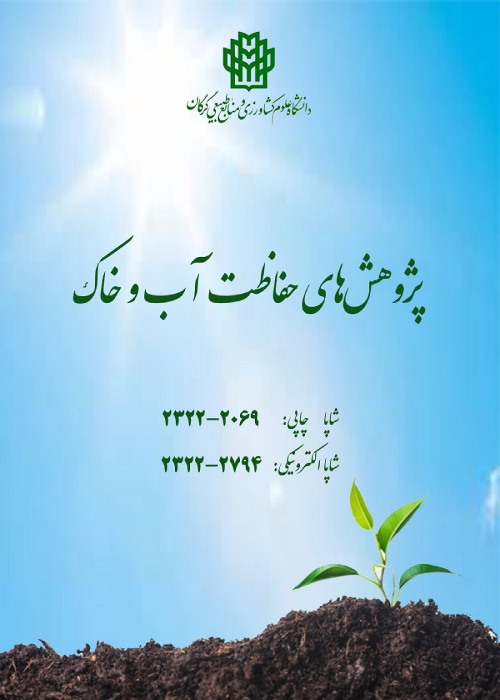Evaluation of simultaneous effect of partial root zone drying and vermicompost on some physiological characteristics of maize (Zea mays L.) SC704
Author(s):
Article Type:
Research/Original Article (دارای رتبه معتبر)
Abstract:
Background And Objectives
Using soil moisture storage techniques, simultaneously with irrigation management practices play an important role in coping with the problem of water shortage and water crisis. Therefore, the aim of this study was to evaluate the simultaneous effect of partial root zone drying and vermicompost on the water use, yield, biological yield, harvest index and leaf relative water content (RWC) of maize in sari.Materials And Methods
The experiment was arranged in split plots based on complete randomized block with 3 replications were carried out during years 2015 to 2016. The experiment treatments were full irrigation and chemical fertilizer (FIT1) as control treatments, full irrigation and 50% chemical fertilizer 5.5 tons per ha of vermicompost (FIT2), Full irrigation and 11 tons per ha of vermicompost (FIT3), deficit Irrigation and chemical fertilizer (DIT1), deficit irrigation and 50% chemical fertilizer 5.5 tons per ha of vermicompost (DIT2), deficit irrigation and 11 tons per ha of vermicompost (DIT3), partial root zone drying irrigation and chemical fertilizer (PRD1), partial root zone drying irrigation and 50% chemical fertilizer 5.5 tons per ha of vermicompost (PRD2), partial root zone drying irrigation and 11 tons per ha of vermicompost (PRD3); while in DI and PRD 65% water of FI was irrigated. TDR access tubes were installed in the soil profile to measure soil water content.Results
The results showed that the effect of irrigation treatments was significant on all physiological parameters considered in this study. The effect of fertilizer treatments was significant on all parameters except RWC. The highest yield was attained in FIT2 treatment, equal with 8 and 8.2 tons per ha in 2015 and 2016, respectively. The PRD treatments was caused to significant increase in yield, biological yield and RWC compared with the DI treatment. The use of vermicompost in combination with chemical fertilizer increased yield, biological yield and harvest index. Vermicompost increased RWC was compared to chemical fertilizer.Conclusion
simultaneous use of PRD and vermicompost was saved more water (26.3 %) than using them separately. Compared with FIT2 treatment was no significant difference in the values of yield and other physiological parameters of maize. Therefore, PRD2 is recommended to compatibility with the problem of water shortage. Conclusion
simultaneous use of PRD and vermicompost was saved more water (26.3 %) than using them separately. Compared with FIT2 treatment was no significant difference in the values of yield and other physiological parameters of maize. Therefore, PRD2 is recommended to compatibility with the problem of water shortage. Keywords:
Language:
Persian
Published:
Water and Soil Conservation, Volume:24 Issue: 5, 2018
Pages:
195 to 209
magiran.com/p1790322
دانلود و مطالعه متن این مقاله با یکی از روشهای زیر امکان پذیر است:
اشتراک شخصی
با عضویت و پرداخت آنلاین حق اشتراک یکساله به مبلغ 1,390,000ريال میتوانید 70 عنوان مطلب دانلود کنید!
اشتراک سازمانی
به کتابخانه دانشگاه یا محل کار خود پیشنهاد کنید تا اشتراک سازمانی این پایگاه را برای دسترسی نامحدود همه کاربران به متن مطالب تهیه نمایند!
توجه!
- حق عضویت دریافتی صرف حمایت از نشریات عضو و نگهداری، تکمیل و توسعه مگیران میشود.
- پرداخت حق اشتراک و دانلود مقالات اجازه بازنشر آن در سایر رسانههای چاپی و دیجیتال را به کاربر نمیدهد.
دسترسی سراسری کاربران دانشگاه پیام نور!
اعضای هیئت علمی و دانشجویان دانشگاه پیام نور در سراسر کشور، در صورت ثبت نام با ایمیل دانشگاهی، تا پایان فروردین ماه 1403 به مقالات سایت دسترسی خواهند داشت!
In order to view content subscription is required
Personal subscription
Subscribe magiran.com for 70 € euros via PayPal and download 70 articles during a year.
Organization subscription
Please contact us to subscribe your university or library for unlimited access!



